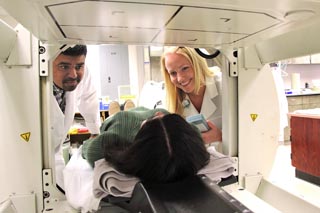Four programs in the School of Health Professions at the University of Alabama at Birmingham received grants totaling $2.4 million from the U.S. Department of Health and Human Services Health Resources and Services Administration (HRSA) to fund scholarships for students from disadvantaged backgrounds who are enrolled in a health professions program.

The four programs – Clinical Laboratory Science, Nuclear Medicine Technology, Physical Therapy and Physician Assistant – will award nearly 15 scholarships per program per year for four years in the amount of $10,000 to $15,000 each that will be applied toward a student’s tuition and fees.
According to the Bureau of Health Professions of HRSA, the majority of the counties in the state of Alabama are designated as economically disadvantaged and 35 of the 67 counties in Alabama are classified as low-education counties.
“Minorities tend to be underrepresented in higher skilled, higher paid health-care professions such as nuclear medicine technology,” says Norman E. Bolus, M.S.P.H., director of the NMT program. “Living expenses coupled with the high cost of tuition can be an insurmountable burden when disadvantaged students are unable to work due to the full-time nature of health professions programs.”
| The four programs – Clinical Laboratory Science, Nuclear Medicine Technology, Physical Therapy and Physician Assistant – will award nearly 15 scholarships per program per year for four years in the amount of $10,000 to $15,000 each that will be applied toward a student’s tuition and fees. |
Just receiving a bachelor’s degree is not enough, as some health professions require a graduate degree.
“The availability of these scholarship funds will be critical for some students in making choices in career plans,” says Sharon Shaw, P.T., Dr.P.H., chair of the Department of Physical Therapy. “Financial assistance for doctoral training is a necessity for many students to pursue advanced degrees.”
Getting students to campus and completing their education is just one hurdle. The other is increasing diversity in the health professions workforce.
“The lack of diversity is a key barrier to ensuring a culturally competent health-care system at the provider, organizational and system levels,” says Patricia R. Jennings, Dr.P.H., director of the Surgical Physician Assistant program. “It diminishes our nation’s capacity to eliminate racial and ethnic health disparities and compromises our national capacity to advance the health sciences. Increasing the number of program graduates from diverse communities is one important step in addressing the health-care needs of our diverse populations.”